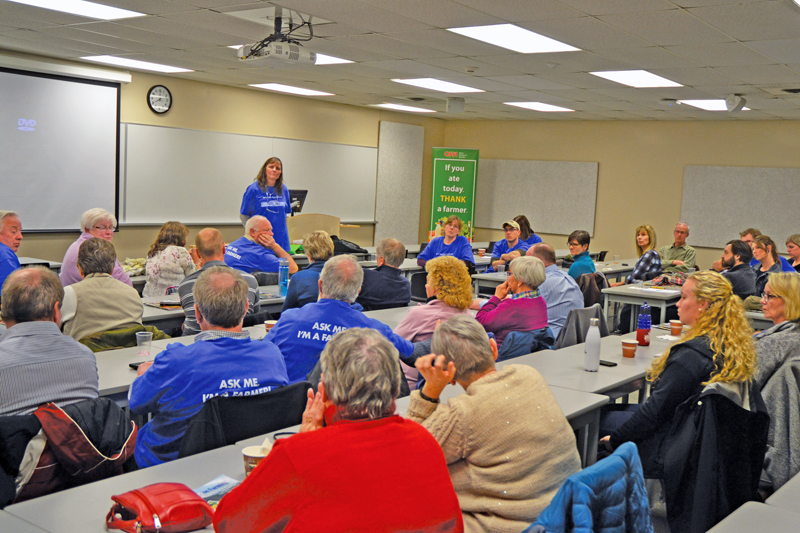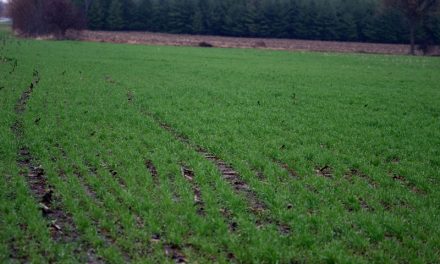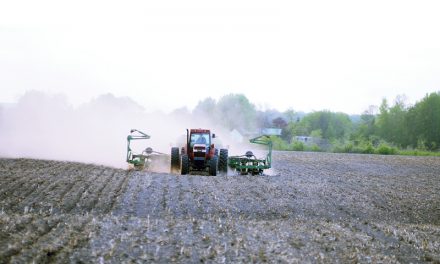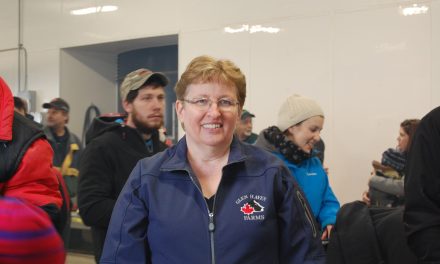Open for discussion
Leeds Federation of Agricultre hosted a documentary and discussion night on April 5. The evening was an opportunity for producers and consummers to learn, ask questions and hear different sides of the GMO issue. Sawyer Helmer photo
by Kalynn Sawyer Helmer
AgriNews Staff Writer
BROCKVILLE — In early April, the Leeds Federation of Agriculture (LFA) hosted a movie and information night for producers and consumers. The 2016 documentary Food Evolution was shown to a crowd of a few dozen people, at least half of whom had agricultural experience.
The film depicts two farming communities where mass fear of GMOs led to legislation banning their use. In these communities, however, GMOs were one of the few methods able to save the crops from complete annihilation due to disease. The film examines the nature of GMOs and looks at some of the evidence to support or refute their benefits.
LFA member Eleanor Renaud aimed to encourage discussion and to open minds throughout the evening. She also enlisted the help of a few producers who made themselves available to answer questions after the movie.
Those producers ranged from GMO crop growers and beef farmers to conventional and poultry farmers. The mix also included producers using both no-till and till practices. They each had the opportunity to explain their farm practices and methods to help viewers direct their questions later. Warren Schneckenburger, Ontario Soil and Crop Improvement Association (OSCIA) director, spoke prior to the film and explained, “GMOs are just a tool. They are a technology.”
The film addresses a narrow subject, one which explains what GMOs are on the basic level of gene modification. Consumer fears behind GMOs were shown to be misdirected and, in the case of the two communities, rules were changed to allow for the GMO crops. As Jackie Kelly-Pemberton, OFA Zone 11 director, said to the crowd after the film, what consumers do not realize is that the discussion should not be about GMOs, but how they are farmed.
Organic farmers Melissa and John Ondrovcik added, “I think the movie zeroed in on a narrow slice of the debate and there are so many other dimensions to it that a short movie can’t address that still need to be part of the conversation. Food sovereignty, food security, concentration in the agribusiness, all of this type of stuff still needs to be addressed.”
For those who know what GMOs are, opinions are not necessarily very strong. The evening then acted as a way for organic and non-organic producers to discuss and hear other sides of farming ideology. “We didn’t have a strong opinion to begin with on the very narrow subject of whether or not it’s acceptable to change a seed at the level of its DNA. It was nice to hear, though, that the other farmers who came are more open to alternative methods, like crop rotations, other than just the application of chemicals and the growing awareness of low till or no-till practices. It seems, from the impression of the room, that the younger farmers are getting more interested in looking at the soil and caring for it in a different manner,” said John Ondrovcik.
For the organizers, these discussions among farmers as well as between farmers and consumers meant the evening was a success. Kelly-Pemberton said, “It was great to see a lot of rural people and those interested in food coming out and hearing about what we do and watching the movie. It’s important that we have those conversations to try and answer and clarify. We also have some questions ourselves. It’s good that we can be open and communicate well with our consumers.”
One of those consumers included local councillor Rob Smith who said he found the evening insightful and was pleased to hear from producers about how the township can help mitigate risks on the farmland when it comes to hazardous weeds in rural areas. “As a municipal politician it’s nice to hear what farmers are doing in our area. To hear other farmers say they don’t cultivate their land was a surprise to me, because I see farmers out cultivating. Also, as a politician we are always asked about spraying roadsides or ditches and I was always supporting spraying our ditches to protect the farmers’ land so we are not encroaching toxic weeds in their area. I think overall it was a good event and I’d be coming back again.”
While the event was free to attend, donations were being accepted to the local food bank and the small crowd managed to donate 75 pounds of food and $90 in donations. Renaud was pleased with the turnout and said she would consider a similar event in the future.













